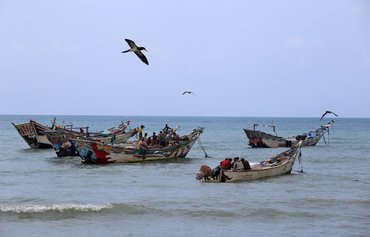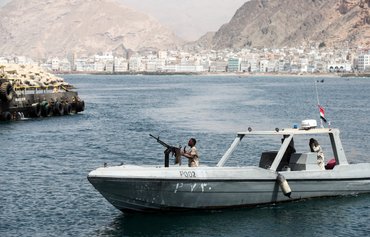ADEN -- The United Nations Security Council (UNSC) has reimposed an arms embargo on the Houthis, following attacks this year on the United Arab Emirates (UAE) and Saudi Arabia claimed by the Iran-backed group.
Since UNSC Resolution 2624 was adopted on February 28, the Houthis have continued to stage attacks, claiming responsibility for a March 11 drone attack on a Saudi oil refinery that caused a fire but did not disrupt supplies.
The kingdom's energy ministry described the attack as an act of "sabotage and terrorism", according to the Saudi Press Agency (SPA).
The Houthis said they fired three drones at the Aramco refinery and six more at the oil giant's facilities in the southwestern cities of Jizan and Abha "and other sensitive locations", AFP reported.
The attack follows a series of similar assaults on Saudi and Emirati facilities.
During the February 28 UNSC session, some members stressed the importance of enforcing the arms embargo on the Houthis, in order to undermine the group's sources of power and curb its criminal activity.
Separately, the UAE cabinet on February 24 imposed sanctions on one person and five entities associated with the Houthis.
According to the Emirati News Agency (WAM), the designation is part of the UAE's persistent targeting and disruption of networks associated with the financing of terrorism and related activities.
'A clear message to the Houthis'
UNSC Resolution 2624 reiterates Resolution 2140 of 2014, and Resolution 2216 of 2015, each of which uphold Chapter VII of the UN Charter, Yemeni Deputy Minister of Justice Faisal al-Majeedi told Al-Mashareq.
Chapter VII pertains to action with respect to threats to the peace, breaches of the peace and acts of aggression.
Al-Majeedi said the resolution is significant because it "targets the group as an entity, marking a difference with previous resolutions".
Previous resolutions sanctioned specific Houthi leaders -- Abdul-Malik al-Houthi, Abu Ali al-Hakim, Abdul-Khaliq al-Houthi -- and other individuals, prohibiting any export of arms to them, he said.
The new resolution, which calls for arms to be banned from the group as an entity, deems any dealings with the Houthis to be a violation of resolutions regarding regional and international security, he said.
The language of the resolution describes the Houthis as a terrorist group, al-Majeedi explained, adding that it "sends a clear message to the Houthis that they are pariahs in the international community".
'A single terrorist bloc'
Al-Majeedi stressed the need for international observers to monitor the implementation of the resolution, noting that expert reports show weapons and drones have been confiscated en route to the Houthis in Yemen.
Iran's Islamic Revolutionary Guard Corps (IRGC) has supported the Houthis with arms and training since their inception, and shipments of arms destined for the Houthis have been seized at regular intervals in regional waters.
"The humanitarian situation [in Yemen] is catastrophic, especially in light of the escalation of military operations," said Fahmi al-Zubairi, director of the human rights office in Sanaa province.
He accused the Houthis of carrying out indiscriminate attacks, which have harmed civilians inside and outside the country.
The new UNSC resolution "is a diplomatic victory", he said, because the language describing the Houthis as a terrorist group will help hold to account "those who commit crimes against humanity and war crimes".
The successful passage of the arms embargo extension is "evidence of the damage caused by Iran's weapons at the hands of its Houthi militias, both on the local and external levels and to international economic interests", he said.
The language of the resolution enables the countries of the region and world to deal with the Houthis "as a single terrorist bloc, undermining the basis of its power and those who stand behind it", al-Zubairi said.

![Fighters loyal to the Houthis stand guard while supporters of the Iran-backed group attend a speech given on a screen by the group's leader Abdulmalik al-Houthi during a rally in Sanaa, on September 2. [Mohammed Huwais/AFP]](/cnmi_am/images/2022/03/15/34500-Yemen-Houthis-arms-600_384.jpg)





